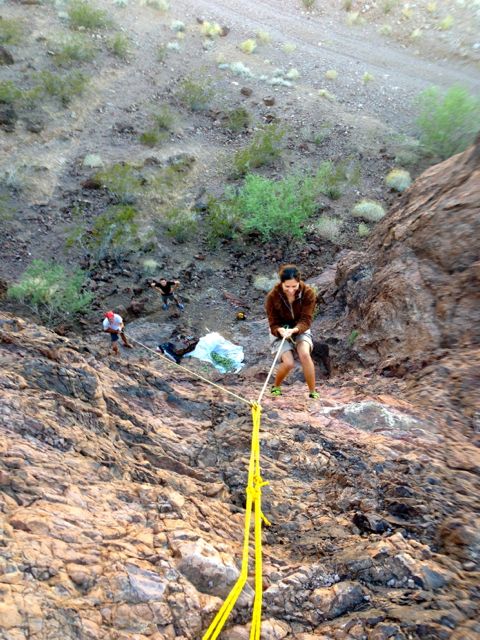On a recent trip to Lake Mead my rock-climbing nephews invited me to go climbing while the baby was napping.
I turned them down immediately because I’m afraid of heights. I’d much rather do yoga, or write, or nap, or anything that’s on the ground level.
Twenty minutes later I was hooked up to ropes and pulleys, climbing up the face of a rock and terrified of falling. I clung to the rock on the outside, but quickly realized dropping into my senses was the only way I would be able to get up the wall.
I had to feel with my feet for the next spot to step on sometimes without seeing it. I had to trust that the rock would support me and I had to trust my body in a way I’ve never had to trust it before.
I thought reaching the top was the hard part until I asked how to get down. Just lean back, my nephew said, which translated to me as letting go of the rock I’d been clinging to the whole way up. The only thing scarier than holding on to a rock 30 feet up was letting go of it.
He repeated what he said and explained that they were going to lower me down, but I had to let go in order to be lowered down without hitting the rock en route.
I fearfully leaned back and let go of the rock. Halfway down I got more comfortable with it and actually kind of enjoyed the ride.
I often think of holding on and letting go as polar opposites, black and white, either-or. I’m either holding on or I’m letting go. My climbing adventure allowed me to explore on a physical plane the seeming polarity of holding on and letting go.
Normally we experience these years apart in our lives, such as getting attached to a partner or child and then having to let them go through a breakup, death or sending them off to college. In the time it took me to climb up the rock and get back down I saw how graceful, complementary, and fluidly one concept gave way to the next, much like how one season gives way to another. Gracefully, graciously, respectfully.
This experience reinforced something I’ve been trying to welcome into my life as a new mother, which is embracing paradox.
In his book, The Courage to Teach, J. Parker Palmer explains it like this:
“The poles of a paradox are like the poles of a battery: hold them together and they generate the energy of life; pull them apart, and the current stops flowing. When we separate any of the profound truths in our lives, both poles become lifeless specters of themselves—and we become lifeless as well.”
Throughout our lives we often have to switch from holding on to letting go without much notice. My transitions have historically been less than graceful, mostly because I am terrified of the letting go part and have a hard time trusting the unknown.
In reality the letting go we do in life is not the standalone experience we like to paint it as. It’s the other end of holding on and is essential to a complete and deep experience of life.
Taking it a step further one could say the same is true of life and death. When we isolate the less-pleasurable parts of life—the letting go, the death, the loss—we cut ourselves off from the full experience of the part we’re trying desperately to preserve.
Instead of fighting a lifelong battle with letting go as if it was an enemy to conquer, I now try to step into its flow, honor its cycle, and respect its place in the natural rhythm of life.
This week I’m faced with letting go of something I’ve been holding onto for the past 12 years: a great job. As I struggle with the fear of leaning back, away from the rock I’ve clung to for support all these years, I remind myself of Palmer’s words:
“The tension that comes when I try to hold a paradox together is not hell-bent on tearing me apart. Instead, it is a power that wants to pull my heart open to something larger than myself… if I can collaborate with the work it is trying to do rather than resist it, the tension will not break my heart—it will make my heart larger.”
As I lean back into the unknown and begin to trust life on a level I’ve never had to before, I realize the time for clinging is over.
In my rock-climbing experience if I continued to cling instead of letting go I would hinder my descent, increase my chances of injury and prevent myself from enjoying the ride. In real life if I insist on clinging I hinder what is a natural transition, make the process harder on myself and prevent myself from enjoying the ride.
I don’t know about you, but my life’s too short to not enjoy the ride.
~
Love elephant and want to go steady?
Sign up for our (curated) daily and weekly newsletters!
~
~
Author: Monique Minahan
Editor: Travis May







Read 0 comments and reply